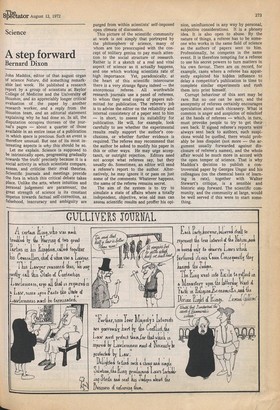Science
A step forward
Bernard Dixon
John Maddox, editor of that august organ of science Nature, did something remarkable last week. He published a research report by a group of scientists at Baylor College of Medicine and the University of Houston, and an appreciably longer critical evaluation of the paper by another research worker, and a reply from the Houston team, and an editorial statement explaining why he had done so. In all, the disputation occupies thirteen of the journal's pages — about a quarter of those available in an entire issue of a publication in which space is precious. Such an event is therefore unusual. But one of its most interesting aspects is why this should be so.
Let me explain. Science is supposed to be intrinsically open, progressing gradually towards 'the truth' precisely because it is a social activity in which scientists compare, assess, and criticise their rival theories. Scientific journals and meetings provide the fora in which this critical debate takes place. Unlike the arts, where intuition and Personal judgement are paramount, the great strength of science is its constant impetus towards factual self-correction, as falsehood, inaccuracy and ambiguity are purged from within scientists' self-imposed open climate of discussion.
This picture of the scientific community at work is not simply that portrayed by the philosophers of science, many of whom are too preoccupied with the concept of solitary genius to pay much attention to the social structure of research. Rather is it a sketch of a real and vital aspect of science as it actually happens, and one which working scientists rate of high importance. Yet, paradoxically, at the heart of this scientific intercourse there is a very strange figure indeed — the anonymous referee. All worthwhile research journals use a panel of referees, to whom they send copies of papers submitted for publication. The referee's job is to advise the editor on the reliability and internal consistency of a paper sent to him — in short, to assess its suitability for publication. He will, for example, look carefully to see whether the experimental results really support the author's conclusions, or whether further evidence is required. The referee may recommend that the author be asked to modify his paper in this or other ways. He may urge acceptenet, or outright rejection. Editors need not accept what referees say, but they usually do. Sometimes, an editor will send a referee's report to the author. Alternatively, he may ignore it or pass on just some of the comments. Whatever happens, the name of the referee remains secret.
The aim of the system is to try to simulate a state of affairs where a totally independent, objective, wise old man can assess scientific results and proffer his opi nion, uninfluenced in any way by personal, subjective considerations. It is a phoney idea. It is also open to abuse. By the nature of things, a referee has to be someone who works in the same field of science as the authors of papers sent to him. Professionally, he competes in the same event. It is therefore tempting for a referee to use his secret powers to turn matters in his own favour. There are on record, for example, cases where a referee has apparently exploited his hidden influence to delay a competitor's publication in time to complete similar experiments and rush them into print himself.
Corrupt behaviour of this sort may be rare. Bt no one can be sure, and the anonymity of referees certainly encourages speculation about such chicanery. What is common is anger and suspicion of mischief at the hands of referees — which, in turn, must provoke people to try to get their own back. If signed referee's reports were always sent back to authors, such suspicions would be quelled, there would probably be less disquiet (not more — the argument usually forwarded against disclosure of referee's names), and the whole affair would be much more in accord with the open temper of science. That is why Maddox's decision to publish a controversial paper by Georges Ungar and his colleagues (on the chemical basis of learning in rats), together with Walter Stewart's critique, is a sensible and historic step forward. The scientific community, and the community at large, would be well served if this were to start something.


























 Previous page
Previous page